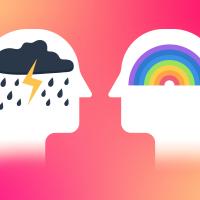If you’ve been having strange and terrifying dreams lately, or suffering from a lack of sleep during the coronavirus pandemic, you’re not alone. Dreams are often symptoms of the larger things happening in our lives, and in the middle of a generation-defining crisis, many people are noticing an uptick in irregular sleeping and dreaming. Here’s why.
Irregular Sleep During the Coronavirus
It’s long been suggested that the nature of our dreams is closely connected to our mental and physical well-being while awake. Bizarrely vivid and fantastical dreams can sometimes help an individual overcome intense memories and psychological stressors, within the safe space of the subconscious. Nightmares can serve as warning signs for anxieties that have gone consciously unperceived.
Science shows that during dream states, stress sends the brain on a sort of “trip” which produces reactions similar to those initiated by psychedelic drugs. Increased stress activates the same nerve receptors as psychedelics, and that triggers lucid dreams.
While this is all a normal process, more and more people have been recollecting their unusual dreams due to increasingly-interrupted sleep during the coronavirus pandemic. Both a lack of activity and an increase in screen-time can cause restless sleep and frequent awakenings, which lead to increased dream recall.
Coronavirus Insomnia Explained
All of these factors have many more people struggling with insomnia than usual. Insomnia is a serious issue that can leave those suffering from it feeling relentlessly exhausted and incapable of performing even the simplest of tasks.
Dr. Britney Blair, a clinical psychologist and certified behavioral sleep medicine specialist, explains, “What a lot of people are reporting in the context of the pandemic and increased stress is more active, stress-related dreams… Even not in the midst of a pandemic, around 30% of people suffer from insomnia.”
Those numbers are growing exponentially and there are disastrous health implications attached to chronic and long-term insomnia. It can weaken the immune system, cause depression and anxiety, and put an individual at a higher risk of experiencing a stroke, seizures, or asthma attacks.
It’s no wonder that medical professionals are seeing an extreme uptick in those seeking help. Pre-existing mental health issues are being compounded by the fear of contracting the virus, relationships are being strained, income is being affected, and there are a myriad of other causes for concern.
Research shows that the weekly prescriptions filled for antidepressant, anti-anxiety, and anti-insomnia medications between February 16 and March 15 increased by 21%, peaking the week that COVID-19 was declared a pandemic. That same research shows that 78% of these were for new prescriptions.
A Greater Risk on the Frontlines
One group that often goes unnoticed is the people who are fighting the virus on the frontlines. Healthcare workers and first responders are suffering through much of the same stress and anxiety-related issues as the rest of the world, but they’re doing so while managing the responsibility of helping those afflicted with the virus.
These issues can lead to acute stress disorder, which is similar to post traumatic stress disorder but occurs while the individual is still in the moment of trauma. Signs of acute stress disorder can include difficulty breathing, nausea, and feelings of despair or distress.
Acute stress disorder, if untreated, can lead to post traumatic stress disorder which typically requires a longer, more complex and medicated treatment regimen.
The medical professionals suffering from acute stress disorder most severely right now are seeing the devastation of the pandemic firsthand, while struggling to protect their own well-being. More than anyone, these healthcare workers need good sleep during the coronavirus pandemic.
Dr. Blair is doing her part to provide relief to those suffering from these issues. She launched a campaign to get psychologists and therapists to dedicate one hour of their time each week to a virtual therapy session with someone on the frontlines of the coronavirus fight.
Blair said, “There are quite effective treatments for acute stress disorder, including being able to just talk to someone, and lots of doctors are available via telemedicine. The earlier we can get on top of recognizing that we may need support, the less likely we are to have the impact of this pandemic affecting our mental and physical health.”
We’re all struggling in different ways right now, some more than others, but collectively becoming more aware of our mental health and seeking support before conditions worsen will help all of us sleep a little better at night.
For more interesting news about the people and ideas that are changing our world, subscribe to Freethink.
Directors Note: If you’re a frontline healthcare worker or first responder in California, visit Covid19CounselingCA.org for free psychological support, provided by the California Psychiatric Association and The Clinic.
